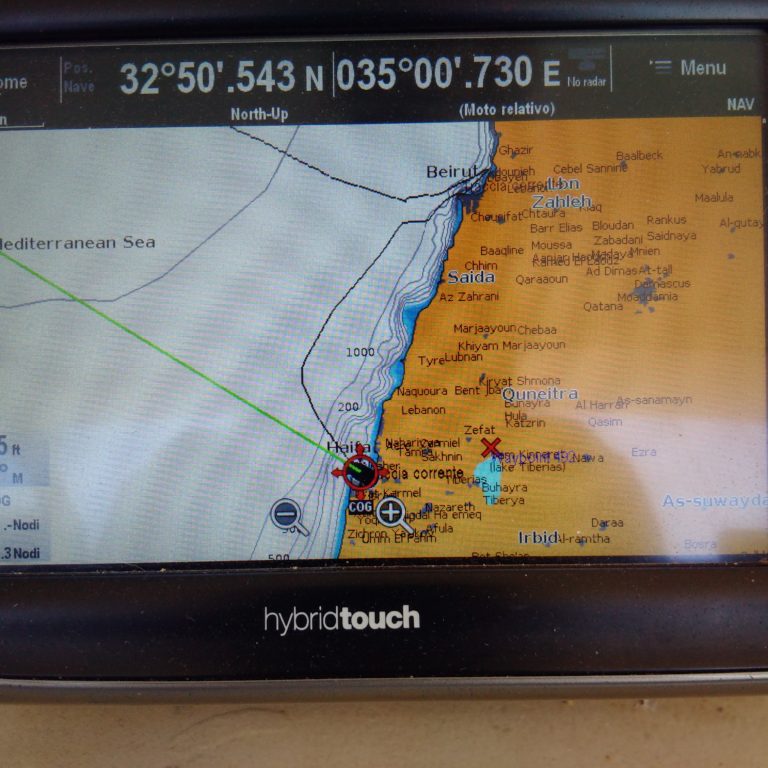
(By Simone Perotti)
We have not told enough about these weks, taken from travel, navigation, and interesting places where we are. We sailed from Limassol (Cyprus), on a route to Beirut. At the port someone warned us, “be careful … it’s dangerous.” We wondered if we had underestimated something. Then, as you have to do when you have a precise route in your heart, we left.
The award came right away: the most beautiful border of Mediterranea since the beginning of its journey, even better than we had between Crete and Kalymnos, which was also exhilarating.
Between Limassol and Beirut 130 miles sailing, full cross, two meters wave, on 20 knots of grecale. Mediterranea has touched the 10 knots of speed, remaining always above the 8 and for hours over the 9th. Not a crunch, a tinkering, a flutter on board. Silence. And sea. And wind. And full moon that made us alignment channel at the beginning, then disappear in our wake at dawn.
In Beirut, the military did not wait. They intercepted us at sea, after contacting the radio (Oscar Charlie Radio, CH16), they boarded us, an officer boarded, searched the boat briefly to see if there were any men or guns. Then they gave us green light for landing at Saint George Marina, in central Beirut.
Slow and long formality, as usual in some countries. The Embassy of Italy has supported and helped us, and I think everything has done well for their intercession. To those who came from the sea (others reached us by plane) they gave a paper with a photocopy of the passport and stamps to be renewed every day. A “short-pass” as they called it. Only they have held the passports, which is rather unpleasant. For two weeks we did not get it back, except for the departure. Above, no stamp. As we have never been to Lebanon.
We left from Beirut awakening at 5am, after a military check on board and a series of further bureaucratic steps. We had to declare our destination, and to that question we replied that we were going to Limassol, Cyprus. A lie, dictated by the particular condition of these lands. We had to go to Tel-Aviv, via Haifa, but to say to Lebanese that you go to Israel, the fierce enemy of ever, it can sound like a provocation. Here, to speak of Israel, everyone says “the state to the south”. Names mean, they are not just letters of the alphabet. The advice of not revealing our true course has come from many parts, and shortly after being sailed we appreciated all the responsibility.
It should also be remembered that on the sailing forums and in the various sources consulted, we could not find anyone who would say that sailed between Beirut and Haifa. Very few have made the course, but broke it with Cyprus, to create a gap between the two countries. Everyone told us that this direct route was not possible. Yet, as an Italian boat, therefore free to navigate anywhere by observing the rules, I argued that we could instead try. A few days before the departure, I had written to Israeli Navy, the absolute authority at sea in Israel, and they had not told me “no,” but given the indications of approach. Of course, we had some apprehension.
Outside the port of Beirut I took a diagonal course to get out of Lebanese waters without pulling a straight edge and perpendicular to avoid losing miles and water. But Oscar Charlie followed us on the radar, and they started calling us to ask why that route, as it turned out that we had to go to Cyprus. For three hours (blessed! since there were very useful for the arrival!) We explained that we had wave in the bow and wind against and that we were trying to navigate to the best then fix the course in succession. Before they got us there, then no more. As you can see from the gps map in the picture above, at a certain point they ordered to take the route to Limassol, leaving Lebanese territorial waters for the shortest route. We were forced to obey the order.
Avoiding to risk misunderstanding, we took two first longitudes before going south. At that point the drifting sidewalk to go to the south was noticed. “Why do you go south? Limassol is west! ” – “We are in international waters, we decide on our best route.” Acting on the tip of the law of navigation is possible, of course, even if in these part of world may not be always appropriate.
At this point, communications have become more dry and dry. They told us to approach the Limassol route. Until Oscar Charlie (the official voice of the captain and the Navy, what we would call the Torre), Oscar Sierra entered, and we did not know who they were. The voice on the other side was dry, fast, nervous. Before they told to go to Limassol, then to hire 240°. At that point I was sure they were about to reach us with a ship. We had to choose.
The problem, as you understand, was that we had declared something that we were not doing now. And what we were doing was perfectly clear to the Lebanese military. True, we had a series of avenues of ours, namely that the destination declaration is not binding and that the commander of a boat can change course when he or she wants to fulfill his or her duties or duties towards third parties.Then that we were now in international waters, so the Lebanese authorities could not give us any rout or board. And yet, as is the case every day in many waters, in some countries it is not appropriate to challenge or prove strength with the authorities. I was just annoyed with something: I wanted to declare before we left that we were going to Tel Aviv. An Italian boat, which has no problem with the two countries in war, that must not hide anything that has no evil intent on anyone, have the law to pass. To declare something unreal I do not like, much less at sea. And yet, if we did, somebody said they would not allow us to go, they would have stories. You do not know. We will never know. Certainly, sailing off the Lebanese waters, convinced that soon we would have seen a unit of the Lebanese naval coming, we were not very peaceful. We looked at the horizon, in silence, in trepidation ….
After a couple of hours we started to relax, although I had a further concern: the border. Even though we were wide at least fifteen miles from the mainland, we would have gone to a no-sailing zone that keeps Israel’s waters and Palestinian waters away. The Lebanese Navy would have intercepted us there and would have warned us to change the route, not to cross the border? Would we have Israeli units on the horizon and contact Lebanese units? Would a moment of tension be created? We’d find out soon.
We also had another problem. With Israeli Navy we agreed to call them 50 miles off Haifa, then 40 miles, and then to 30, giving our approach to our approach. The channels available were 26 and 16. But could I call them on the CH16 by hearing Oscar Sierra that we were officially going to Israel, so not in Limassol as stated? I chose not to do it. I only tried on the CH26, but without getting answers. We were coming to the border without giving any communication as established. The Israeli Navy saw a naval unit approaching from Beirut. By radio they started calling, but we felt bad, we could not hear the latitude and longitude they were called. Meanwhile, something quite disturbing was happening, which we did not expect. Two hunting planes, let’s say Israelis, crossed over us by launching air-raid missiles, or at least they seemed to be: the planes left behind five or six white-smoke puffs, like missiles dropping from the wings of the plane Then turn on their propulsion and leave. Those white puffs in the blue sky, seen many times in documentaries or in the war movies, were a sign of salve to name something? We will never know this either.
At 30Miles, now out of the waters in Lebanon, we feel called out Israeli Navy, with whom we exchanged emails in the previous days (although we were not advised to say by email that we were in Israel or to communicate with Israel, not least with the Navy) giving them departure, arrival, unit description, crew names, passports etc. For four hours we had to explain and explain everything, to do international spelling from the boat, to the registration license, to the names, passports, age, birthdays, places. everything. In the end I was hurting my throat for talking on the radio. The voice of Israeli Navy was always feminine, and very courteous and patient, but as always from here, very peremptory. They showed us a way of approaching and asked for the estimated landing time.
Fifteen miles from Haifa approached an armed corvette, with a man sitting in the chair of a machine gun thought, an armed gunman at the center of the unit, but no military on the bridge besides the machine gun (the other time I had sailed here, on the deck there were many and very armed, with the targeted rifles, and the armed gun pointed straight to me depending on the boat’s rails and backs). They turned around, asked all the information again, if we were a weapon etc, etc. Then they greeted us and they spread at great speed. Everyone was wondering where we came from. When we responded to “Beirut”, the frost dropped. The Haifa port arrived with the last light bulb. To accommodate three high-speed motorboats with blue lighted flashes, a man with a bow thruster, others stern. They called us by radio and asked to follow them. A speedboat on the stern, one on the bow, another went back and forth. They led us into the estuary of a river, and made a sign of falling into a dockyard. Waiting for us, about fifteen men and women, all young, all armed, all without uniform, dressed with civil suit. But above all, all in silence. It was now dark, with no more than a breeze, and that silence was strong, tangible, tense. I had the clear impression that they were concerned, arguing, that they were ready, like the police moored on our stern, at any rate. Perhaps they feared that under blankets we had armed men ready to make a rush. Certainly their faces and their silence were very straightforward. Once the earthquake landed, the long line of checks began, interrogating me and someone else in the crew: “who are you, where you go, why have you been Beirut, what did you do there, where, when, with whom, what did you buy, how did you shoot the city, what other places you went, what you have on board etc “. While we were asking for passports and information, the police went up on board alone, without us, which annoyed me, though we all understood the situation and the procedures. Then we went on board with the customs officers, who together with the police robbed everywhere, to the last pocket of the last empty suitcase, inside the last locker. “Do not you have grass?” – “What do you mean grass?” – “Drug!” – “No.” – “Of course!? Really?!”. Who knows why they did not want to believe it. I also made the expression of how to say “no, unfortunately …” but without that it made them smile. With an electronic device they checked the boat, inside and out, maybe a detector of explosives or chemicals. On the floor we saw them relax, then smile, joke. They left after hours, greeted us with courtesy.
When we went to sleep, rather tired and tried for that day, we did not have time to think about anything. The next morning, sailing constantly in radio contact with Israeli Navy, we leftfrom Haifa and reached Tel-Aviv with maestral between 20 and 30 knots. All in all, though complex and scary it was to enter the harbor with strong waves and moorings with wind, I think we were all quiet. Much more we were behind.





Leave A Comment